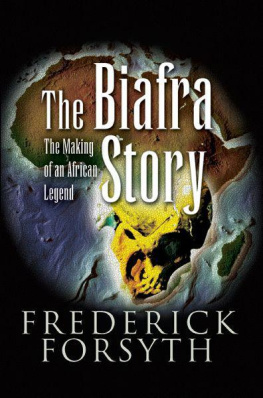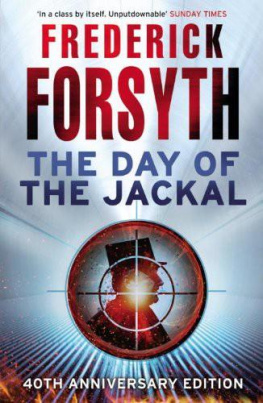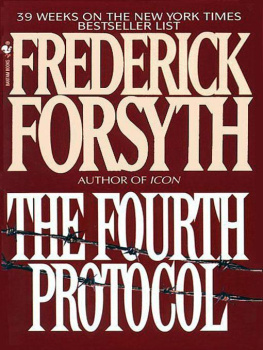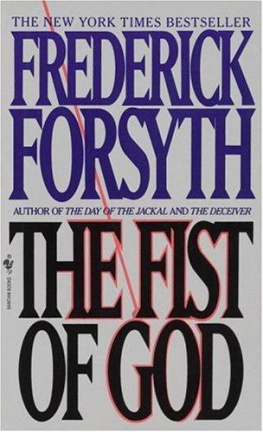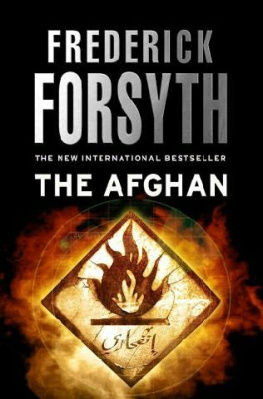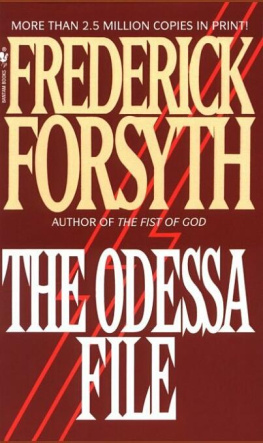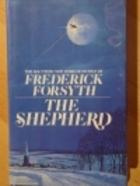Frederick Forsyth - The Biafra Story: The Making of an African Legend
Here you can read online Frederick Forsyth - The Biafra Story: The Making of an African Legend full text of the book (entire story) in english for free. Download pdf and epub, get meaning, cover and reviews about this ebook. year: 2015, publisher: Pen & Sword, genre: Art. Description of the work, (preface) as well as reviews are available. Best literature library LitArk.com created for fans of good reading and offers a wide selection of genres:
Romance novel
Science fiction
Adventure
Detective
Science
History
Home and family
Prose
Art
Politics
Computer
Non-fiction
Religion
Business
Children
Humor
Choose a favorite category and find really read worthwhile books. Enjoy immersion in the world of imagination, feel the emotions of the characters or learn something new for yourself, make an fascinating discovery.
- Book:The Biafra Story: The Making of an African Legend
- Author:
- Publisher:Pen & Sword
- Genre:
- Year:2015
- Rating:4 / 5
- Favourites:Add to favourites
- Your mark:
- 80
- 1
- 2
- 3
- 4
- 5
The Biafra Story: The Making of an African Legend: summary, description and annotation
We offer to read an annotation, description, summary or preface (depends on what the author of the book "The Biafra Story: The Making of an African Legend" wrote himself). If you haven't found the necessary information about the book — write in the comments, we will try to find it.
Frederick Forsyth: author's other books
Who wrote The Biafra Story: The Making of an African Legend? Find out the surname, the name of the author of the book and a list of all author's works by series.
The Biafra Story: The Making of an African Legend — read online for free the complete book (whole text) full work
Below is the text of the book, divided by pages. System saving the place of the last page read, allows you to conveniently read the book "The Biafra Story: The Making of an African Legend" online for free, without having to search again every time where you left off. Put a bookmark, and you can go to the page where you finished reading at any time.
Font size:
Interval:
Bookmark:
Fredick Forsyth was born in 1938 in Ashford, Kent. He was educated at Tonbridge School and Granada University, Spain, before serving in the RAF as a pilot from 1956 to 1958. For three and a half years he worked as a reporter on the Eastern Daily Press in Norfolk, then in 1961 he joined Reuters and was posted the following year, at the age of twenty-three, to Paris as foreign correspondent. He was subsequently sole correspondent in East Germany and Czechoslovakia and, after another period in Paris, he returned to London in 1965 to join the BBC as a radio and television reporter. As assistant diplomatic correspondent he covered the Biafran side of the Biafra-Nigeria war from July until September in 1967, and in February 1968 he left the BBC to return to Biafra; he reported on the war first as a freelance and later for the Daily Express and Time magazine. Fredrick Forsyth, who speaks fluent French, German and Spanish, has travelled widely in Europe, the Middle East and Africa. He has also written The Day of the Jackal, The Odessa File, The Dogs of War and a novella, The Shepherd.

First published in Great Britain in 1969
and reprinted in 2001
and reprinted in this format in 2007, 2011, 2015 by
PEN & SWORD MILITARY
An imprint of
Pen & Sword Books Ltd
47 Church Street
Barnsley, South Yorkshire
S70 2AS
Copyright Frederick Forsyth, 1969, 2001, 2007, 2011, 2015
ISBN: 978 1 84415 523 1
EPUB ISBN: 978 1 84884 606 7
PRC ISBN: 978 1 84884 607 4
The right of Frederick Forsyth to be identified as
Author of this work has been asserted by him in accordance
with the Copyright, Designs and Patents Act 1988.
A CIP catalogue record for this book is
available from the British Library
All rights reserved. No part of this book may be reproduced or
transmitted in any form or by any means, electronic or mechanical
including photocopying, recording or by any information storage and
retrieval system, without permission from the Publisher in writing.
Printed and bound in England
By CPI Group (UK) Ltd, Croydon, CR0 4YY
Pen & Sword Books Ltd incorporates the Imprints of Aviation, Atlas,
Family History, Fiction, Maritime, Military, Discovery, Politics, History,
Archaeology, Select, Wharncliffe Local History, Wharncliffe True Crime,
Military Classics, Wharncliffe Transport, Leo Cooper, The Praetorian Press,
Remember When, Seaforth Publishing and Frontline Publishing.
For a complete list of Pen & Sword titles please contact
PEN & SWORD BOOKS LIMITED
47 Church Street, Barnsley, South Yorkshire, S70 2AS, England
E-mail:
Website: www.pen-and-sword.co.uk
Contents
Prologue
It is now more than thirty years since the last plane I took out of the besieged and crumbling enclave that Biafra had become in December 1969 lifted away from the tarmac at Uli airfield and turned its snout towards Libreville, Gabon.
It was a DC6, flown by a South African volunteer. It carried a hundred sick and dying black children, tended as they lay along the open floor by five nuns. Libreville would mean for them a hospital, careful nursing, nourishing milk and a chance of life. For the exhausted war correspondent in the tail, clutching the concluding tranche of a manuscript, it meant a long haul back to London after more than two years in the bush.
It is strange to read what I wrote all those years ago. With the marvellous gift of twenty-twenty hindsight, it is tempting to revise, re-edit and modernize the script; to temper the polemic, to mute the anger of the opinions.
Yet I have not done so, for I was then a deeply angry young man, and with cause. I had seen such misery, so much starvation and death, so much cruelty inflicted on small children; and I knew that behind it all were vain and cynical men, not a few in high office in London, who had closed their eyes, hearts and minds to the agony of those children rather than admit they might have made a mistake.
Biafra was a mistake; it should and need never have happened. But I have resisted the temptation to be wise after the event, preferring the philosophy of the Beaties song: let it be. In this prologue I will confine myself simply to describing how the book came to be written at all, and in the epilogue (briefly) to what happened after the collapse of final Biafran resistance.
The great bulk of the manuscript was written during January 1969 in a small caravan parked by a roadside in the town of Umuahia, which was then the Biafran capital. It was written in conditions of intense, sweaty heat, and the writing was frequently interrupted by air raids as Russian-supplied MiG fighters, flown by Egyptians on behalf of Nigeria, screamed across the township strafing and rocketing whatever they could. During these raids one had to dive into a slit trench and wait until they went away.
This first manuscript was finished, apart from two chapters, in the last days of January, and I returned with it to London. By then I had spent two extended periods inside Biafra as a war correspondent; the first for the BBC, from 10 July 1967 to 10 September; the second, as a freelance, from 18 February 1968 until the end of January 1969. During these two periods I had personally witnessed most of what is narrated in Part Two of this book.
On returning to London I dug into contemporary archives to finish the two unfinished chapters, The Role of the British Government, and Refugees, Hunger and Help. There were facts and figures for these two chapters that could not be obtained inside the Biafran enclave.
By early March 1969 I had finished the manuscript, which in those days brought the narrative up to the end of January 1969; obviously no further, since one could not see into the future. Accompanied by my agent, Bryan Hunt, I sought a publisher, and found him in Rob Hutchinson of Penguin Books.
The slim paperback was published on 26 June 1969 as a Penguin Special, with a print of 30,000 copies. In the interim I had returned to Biafra and made further notes which brought the narrative up to June 1969.
To my surprise, the book quickly sold out until copies were being unavailingly sought by those who wished to read it. Thus it was that in September Mr Hutchinson urged me to return again to Biafra and prepare for an addendum to the book, bringing the narrative even further up to date, to the end of 1969. The idea was for a reprint in the spring of 1970, or so I understood.
I returned therefore in October and stayed until the latter half of December, finally coming back to London in time for Christmas. Over the period up to 31 December I prepared an addendum to each of the chapters of the second part of the book, bringing the narrative to the end of 1969. In the interim, however, Mr Hutchinson had left Penguin to take up an academic post, a new man had taken his place, and in early January I was informed that a reprint was no longer intended.
But these addenda, covering the period from January 1969 until my plane lifted off from Uli for the last time three days before Christmas of the same year, are now included, and thus complete the story of Biafra.
In fact, Biafra finally collapsed, or was bludgeoned into submission by a tidal wave of military hardware, mainly supplied by Britain, on 10 January 1970. The Biafran leader, General Ojukwu, departed into exile in the Republic of the Ivory Coast, whose President Houphouet-Boigny gave him asylum. Being by then an out-of-work reporter, I tried my hand at novel-writing and jotted down a tale called The Day of the Jackal
The original Biafra Story of June 1969 was controversial at the time of publication; the issue of Biafra was emotive, public concern was widespread. As regards the facts one may say this: although on original publication the book was examined by experts on West Africa at the behest of those who disagreed with the books contents and wished to demolish it, the facts were never seriously contested. There are two errors of fact: one concerns a date which was wrong by twenty-four hours, the other an ambush at Abagana village where a typing error added an extra nought to the Nigerian casualties.
Next pageFont size:
Interval:
Bookmark:
Similar books «The Biafra Story: The Making of an African Legend»
Look at similar books to The Biafra Story: The Making of an African Legend. We have selected literature similar in name and meaning in the hope of providing readers with more options to find new, interesting, not yet read works.
Discussion, reviews of the book The Biafra Story: The Making of an African Legend and just readers' own opinions. Leave your comments, write what you think about the work, its meaning or the main characters. Specify what exactly you liked and what you didn't like, and why you think so.

